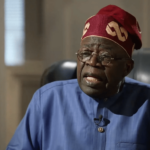President Bola Ahmed Tinubu is the face of a presidency that is keeping its promises to Nigerians. Food may have become unaffordable and insecurity may be suffocating many, but the president has remained hopeful that his government can deliver.
Historically, democracy has not always yielded its famous but sometimes fictional dividends. In fact, in many places where there is democracy, it has sometimes gone on a barren run, the majority content that it fills a vacuum that dictatorship would otherwise fill, unconcerned that it remains childless.
Nigeria’s experiment since 1999 has not been barren even if it has yielded only very few fruits. One of such is the four-year election cycle which brought President Tinubu to power in May, 2023.
Democracy doesn’t give people a voice. Nature does. What democracy does is to help people find the voice which is already in them. This voice is expressed in so many ways and forms. A free press, a free podium in religious houses, and just in the basic expressions of freedom.
When journalists and clerics find their voice in a democracy, not much more can be demanded of that democracy, for a voice is a sentinel that keeps the state on its toes.
The president feels that clerics in Nigeria should watch their sermons and be careful to keep them constructive and not destructive. He conveyed this feeling about a week ago during a Ramadan iftar with religious leaders and traditional rulers at the State House in Abuja.
The romance between religion and the republic in Nigeria is a historic one. Divisions along religious lines remain razor-sharp in a country where millions identify as adherents of one religion or the other. The romance has been used to win elections and even hand out death in the past.
These divisions sharply flared up when Tinubu chose Kashim Shettima as his running mate in 2022. The furor was instant, forcing a farcical hiring of “bishops” to give a flavour of nationwide acceptability. It spectacularly backfired.
In essence, the president’s retort was that religion should regulate its rabble and rabble-rousers.
Unsaid but unremovable from the advice was that the highly placed and “deeply devout” public officers should be able to sit through sermons without the shards of shame and embarrassment that searing sermons can easily scatter, stabbing at what’s left of their conscience.
What should sermons in Nigeria consist of? Sugary sops, empty eulogies or grandiloquent grandstanding? Should pastors and imams mind their business and pinch their lips so they don’t say too much, or should they give lip to the suppressed lamentations of their people, stripping in the process the silence that strips all dignity.
In many ways, it was an unnecessary adjuration, a preaching to the converted. The danger is clear when public officers abdicate their primary responsibility of statesmanship to don the robes of priesthood, no matter how briefly.
Religion is a lot to Nigerians and religious leaders wield no little influence over their followers. This almost hypnotic hold hobbles along with a duty to hold the government to account. While there have always been legitimate questions over how this duty should be fulfilled, questions over its legitimacy have never held firm.
Sure, there is a delicacy to be negotiated when those who reap others for God from the pulpit also have to rattle the source of society’s problems that often lie in the grand landscape of the government, but how should it be done? Should it even be done at all?
There is a near consensus that in speaking truth to power, bite should never be sacrificed for balance, especially as those concerned are often likely to be hard of hearing as a result of their time in the echo chambers of power.
The general nature of religion is to build and not destroy. When people speak in the name of an unseen God, it is usually to tell people that at the end of their lives they will see God, and if they do their best to represent God here, they may even live with God forever. This kind of posturing makes religion a force for good that reinforces itself with each riddle of righteousness it throws to people.
What good could then be better than the common good apart from the good at the end of life that religion is often painstaking about? Security, whether of food or lives or property, is surely a thread which spools effortlessly into the tapestry of the common good. When the state is consistently failing at providing it, it hints at a cancer of ineptitude and inertia. One cure among many for such a cancer is undoubtedly destructive criticism. When it is appropriate, religion as reposed in churches and mosques must dish it out generously.
Criticism is usually uncomfortable for the criticised and significant for the one who is criticising. It exposes, as well as excoriates. Despite its considerable expository power, it slowly but surely loses its potency when its subject is ever-improving and ever-responsive to the reasons it criticises in the first place.
Dictators do nothing to improve or respond to change. So do those who provide incompetent governance.
If the state is up to its task of providing public good, it should not bother about criticism, whether constructive or destructive, as those who make it their business are put out of a job sooner rather than later.
Willie-Nwobu can be reached via [email protected]

 Join Daily Trust WhatsApp Community For Quick Access To News and Happenings Around You.
Join Daily Trust WhatsApp Community For Quick Access To News and Happenings Around You.


